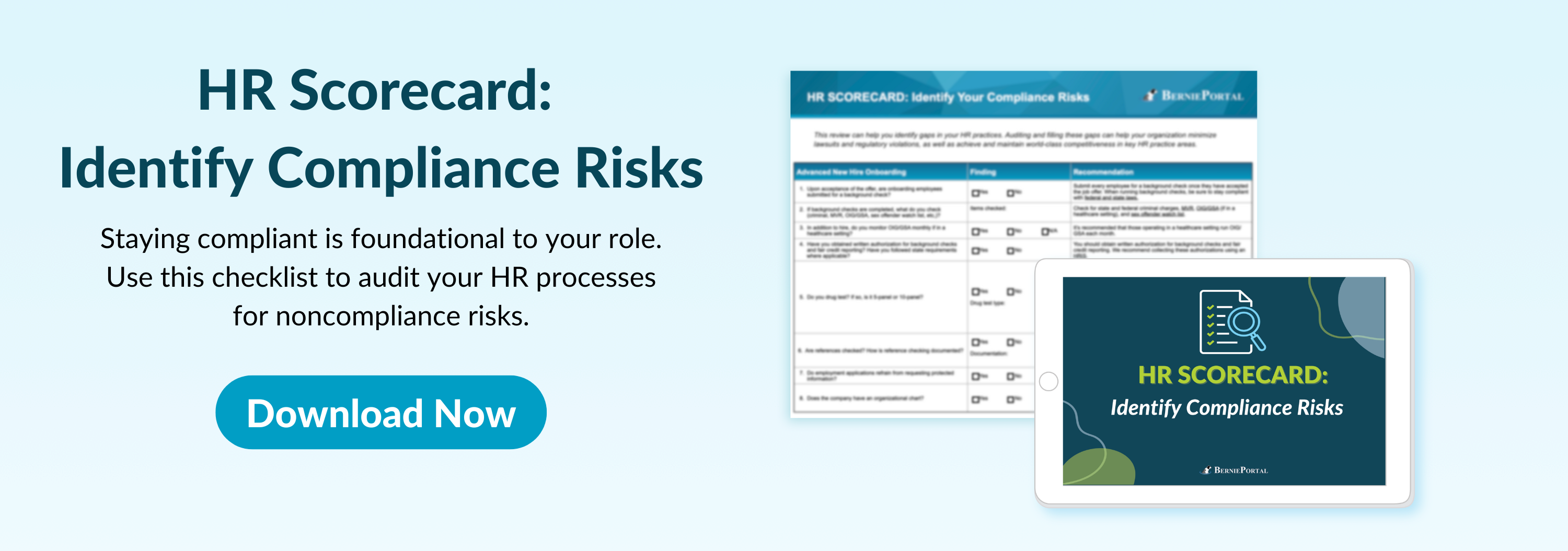
Written by
Aidan Farrish
Aidan is an aPHR-certified writer on the marketing team at BerniePortal. She writes about HR, healthcare, and benefits.
What States Have Pay Transparency Laws?

**This blog is updated regularly as states or other jurisdictions pass new laws.**
Many jurisdictions are passing laws to protect and enforce pay transparency. HR professionals at small to midsized employers may need to take a look at current pay structures or applications to ensure that they are compliant with changing legislation. In some states or cities, missing the mark will incur civil penalties and fines, so keeping up to date is vital to continued success.
Let’s cover what states are passing pay transparency laws and how to get started on enacting financial transparency within your organization.
What Is Pay Transparency?
Organizations are experiencing a bigger push for more transparent practices, namely pay transparency. Pay transparency is when your organization is clear and open about things like pay ranges for certain roles, the compensation awarded for upward movement, lack of retaliation or rules against discussing compensation with colleagues, and more.
For example, an employee applying internally for an open position may have rights due to pay transparency laws to request compensation information on the wage ranges for the role. This helps interested internal applicants make more informed decisions for their careers.
Pay transparency also affects how potential applicants outside your organization understand compensation for your open roles. When posting job descriptions, HR may need to begin including the salary or hourly range for the position.
For example, for an open position hiring a CDL-licensed truck driver, a reasonable salary range to post may be “$75,000 - $90,000,” so interested candidates understand how their experience may result in competitive compensation. Or, for an hourly employee, you can express the pay scale for a Restaurant Manager as “$20 - $30 per hour.”
While some companies are attempting to find loopholes by concealing true ranges using figures like “$30,000 to $500,000,” keep in mind that the Department of Labor won’t hesitate to enact penalties against those who choose to follow the letter of the law rather than the spirit. To avoid the ill will of the DOL, consider taking a look at how you and other hiring influencers write job descriptions. For more guidance on writing job descriptions, check out our template to attract qualified candidates.
Pay transparency isn’t only intended to maintain compliance with the law; it can also improve your culture and recruiting abilities. HR at small to midsize employers can adopt more transparent pay structures to build trust in the organization and to recruit interested candidates more effectively.
Which States Have Pay Transparency Laws?
In recent years, many states or other jurisdictions have passed pay laws that target different components of pay transparency. Here’s a breakdown of what some states have done, are doing, or are considering in the near future:
- California. Went into effect on Jan. 1, 2023.
The existing California Equal Pay Act is adding a requirement that employers with 15 or more employees include the pay range in any job posting if the position could ever be filled in California; remote and hybrid positions are included. This addendum, under SB 1162, defines pay scales as the “salary or hourly wage range that the employer reasonably expects to pay for the position.” So, it does not include benefits like bonuses or tips, but must include commissions wages. Violation consequences: civil penalties of no less than $100 and no more than $10,000 per violation.
- Colorado. Went into effect on Jan. 1, 2021.
Under Colorado’s Equal Pay for Equal Work Act, Part 2, employers must announce to all employees available advancement opportunities and other job openings, and the pay ranges for those positions. Employers in Colorado must also keep records of pay rates and job descriptions. Violation consequences: fines between $500 and $10,000 per violation.
- Connecticut. Went into effect on Oct. 1, 2021.
Under Public Act No. 21-30, employers are required to provide the wage range for a position to any applicant or current employee who requests it, which includes hybrid and remote employees who may not live within the confines of the state. The wage range should include bonuses and commissions. Violation consequences: a civil penalty against the employer from the state.
- Maryland. Went into effect on Oct. 1, 2020.
Under Maryland’s Equal Pay for Equal Work Law, employers are required to provide a wage range for a position if the applicant requests it. This law also lists criteria employers may use to determine if employees in the same position can be paid differently depending on factors such as seniority, experience, and more. Violation consequences: civil penalties occur after a second violation, starting with a $300 fine per applicant, per violation, and increasing to $600 per applicant for further violations.
- Nevada. Went into effect on Oct. 1, 2021.
Under Nevada state law enacted by Senate Bill 293, employers are required to provide the wage or salary range or rate for all new positions, promotions, or position transfers. Employers are also not allowed to request wage range information from applicants. Violation consequences: $5,000 for each violation in addition to investigative costs and attorneys’ fees.
- New York. Goes into effect on Sept. 17, 2023.
The State of New York is expected to begin enforcing its statewide pay transparency law, Legislation S.9427-A/A.10477, in September. The law requires employers to disclose the salary or salary range in any advertisement for a job, promotion, or transfer opportunity within a company. Violation consequences: civil penalties of $1,000 for the first violation, $2,000 for the second violation, and $3,000 for the third and any subsequent violations.
- Rhode Island. Went into effect on Jan. 1, 2023.
Under Rhode Island’s Pay Equity Act, employers must provide a wage range upon request from an existing or prospective employee. The Pay Equity Act acknowledges the difference between small and large employers and offers training and templates on pay transparency tests to ensure employers are compliant with new legislation. Violation consequences: fines starting at $1,000 for the first violation, $2,500 for a second violation within a five-year period since the first one, and increasing to $5,000 for two or more violations in a seven-year period.
- Washington. Went into effect on Jan. 1, 2023.
In an update to prior legislation, Washington is expanding pay transparency rulings. If asked, employers must offer a wage scale to existing employees prior to an internal transfer and must provide the salary range in job postings. This applies only to employers with 15 or more employees. Violation consequences: a civil penalty of up to $500 for a first violation and up to $1,000 or 10% of damages (whichever is greater) for any subsequent violations.
- Illinois. Goes into effect on Jan. 1, 2025.
Illinois has recently passed legislation HB3129 to amend the Equal Pay Act of 2003. The amendment holds employers liable if recruiters fail to include pay ranges and benefits within job postings. The specific language states the bill “Provides that if an employer with 15 or more employees engages a third party to announce, post, publish, or otherwise make known a job posting, the employer shall provide the pay scale to the third party and the third party shall include the pay scale in the job posting.” Violations: unclear.
-
Hawai'i. Goes into effect on Jan. 1, 2024.
Hawaii has voted to expand current pay transparency laws under SB 1057, instructing employers to offer transparent salary and hourly ranges that "reasonably reflect" the work completed. The legislation does not define what constitutes reasonable reflection. The law also prohibits employers from paying those of a "protected category" more than others for "substantially similar" work. Protected categories include race, sex (including gender identity or expression), sexual orientation, age, religion, color, ancestry, disability, marital status, arrest and court record, reproductive health decision, or domestic or sexual violence victim status.
States that have laws banning employers from inquiring about salary history are Alabama, California (and San Francisco), Colorado, Connecticut, Delaware, Hawaii, Illinois, Maine, Maryland, Massachusetts, Missouri, Nevada, New Jersey, New York State, Ohio (only Toledo and Cincinnati), Oregon, Pennsylvania (Philadelphia only), Rhode Island, Vermont, and Washington.
Which Cities or Counties Have Pay Transparency Laws?
States aren’t the only ones enacting pay transparency laws; many cities and other jurisdictions are too. Here is a list:
- Cincinnati, Ohio. Went into effect on March 13, 2020.
The City of Cincinnati Ordinance No. 83 prohibits employers with 15 or more employees from asking about an applicant’s compensation history, as well as requiring employers to provide the pay scale for a position if the applicant is offered a job. Violation consequences: job applicants have a private cause of action for compensatory damages and legal fees.
- Ithaca, New York. Went into effect on Sept. 1, 2022.
Under Ithaca’s local law, employers must list minimum and maximum compensation for jobs, as well as promotions and transfer opportunities. This is in addition to New York State’s own pay transparency laws. Violation consequences: unclear.
- Jersey City, New Jersey. Went into effect on April 13, 2022.
An amendment to Chapter 148 in Ordinance 22-026 of the Jersey City Code states that employers or independent contractors operating in Jersey City and with five or more employees must provide the minimum and maximum salary and/or hourly wage for all open positions. It also strengthens the language from prior legislation banning the use of salary history in recruitment decision-making. Violation consequences: the maximum penalty for any violation is a fine of up to $2,000, or imprisonment or community service for 90 days.
- New York City, New York. Went into effect on Nov. 1, 2022.
In addition to the upcoming New York state law, under New York City law, employers must list salary ranges due to the NYC Human Rights Law. This bill applies only to positions that can and will be performed in New York City, and it also instructs employers to act within “good faith” so loopholes are accounted for. Violation consequences: first violation complaints won’t incur penalties as long as the employer remedies the violation within 30 days. For any violations that are not fixed or any subsequent violations, employers face penalties of up to $250,000.
- Toledo, Ohio. Went into effect on June 25, 2020.
The Pay Equity Act to Prohibit the Inquiry and Use of Salary History in Hiring Practices prohibits employers with 15 or more employees from inquiring about an applicant’s salary history. Those employers must provide the pay scale for a position if the applicant is offered a job. This law also prohibits employers from using voluntarily disclosed salary wage information to make hiring decisions. Violation consequences: job applicants have a private cause of action for compensatory damages and legal fees.
- Albany County, New York. Went into effect on March 9, 2023.
Local Law “E” amends the Albany County Omnibus Human Rights Law to prohibit employers from advertising a job, promotion, or transfer opportunity “without stating the minimum and maximum salary or hourly wage for such position in such advertisement.” A 2017 amendment to its Human Rights Law prohibits employers from requiring that job applicants disclose their prior or current salary information before receiving an offer for a new position. This is in addition to New York State’s own pay transparency laws. Violation consequences: unclear.
- Westchester County, New York. Went into effect on Nov. 6, 2022.
Section 700.03 of the Westchester County Human Rights Law amended prior legislation to include further protections for pay transparency. This applies to any positions that are required to be performed, in whole or in part, in Westchester County. In addition to the upcoming New York state law, employers with four or more employees must include salary ranges on job postings. Violation consequences: civil penalty in the amount of up to $125,000 for employers who commit an unlawful discriminatory practice. The penalty is up to $250,000 for those who commit an unlawful discriminatory practice with willful, wanton, or malicious intent.
Improving Financial Transparency at My Organization
Have you heard of the concept of “levels documents”? Here at BerniePortal, we have found them to be an incredibly effective way of promoting pay transparency. However, that isn’t their only benefit.
A levels document can:
- Show employees how to upskill themselves for their team’s continued success. A levels document contains team information showing a clear trajectory of development for each role. That means employees know exactly where to focus their upskilling efforts, and can attach specific metrics to each goal. This can guide your workforce on the kind of skills each team needs and provides resources employees can refer to at any time for how to best direct their skillset to benefit the whole team.
- Answer any questions about potential promotions or raises. Since a levels document shows how efforts and accomplishments in upskilling are appropriately compensated, employees will know without asking you or their manager exactly how their skills and experiences are reflected in their pay.
- Attract and retain top talent. If you offer transparent pay scales and clear direction on how to move upward in their careers, top talent will flock to your organization—and stay there.
If creating a levels document feels overwhelming, no worries—we have a guide to help you get started. You can pull key leaders in your organization into the conversation to generate a shared stake in this kind of project. After all, the tight labor market may be putting pressure on some of your managers that are trying to fill critical positions on their teams. A document geared toward recruiting and retaining talent might be a vital game-changer in this tight labor market.
Financial transparency isn’t just about pay; it’s also about involving your workforce in your financial success and future goals. Another way to generate a shared stake in organizational transparency is to use an all-in-one HRIS to build trust in HR’s role and host materials, like the levels document, that promotes growth and honesty. For more information on how HR technology can increase trust in your role and help you remain compliant with changing legislation, chat with us to see how we can help.
Additional Resources
You can stay informed, educated, and up to date with important HR topics using BerniePortal’s comprehensive resources:
- BernieU—free online HR courses, approved for SHRM and HRCI recertification credit
- BerniePortal Blog—a one-stop shop for HR industry news
- HR Glossary—featuring the most common HR terms, acronyms, and compliance
- Resource Library—essential guides covering a comprehensive list of HR topics
- HR Party of One—our popular YouTube series and podcast, covering emerging HR trends and enduring HR topics

Written by
Aidan Farrish
Aidan is an aPHR-certified writer on the marketing team at BerniePortal. She writes about HR, healthcare, and benefits.
Related Posts
Each year, new state and local regulations take effect, and with a new administration...
As we approach 2025, it's essential for HR professionals to plan for the upcoming year's...
From major holidays to key compliance and ACA deadlines, here’s everything you need to...









Submit a Comment